By By Ayesha K. Mustafaa,
Contributing Writer,
African-American history is living history, building upon what has been established as well as establishing new blocks to build upon. Mississippi is profoundly rich in African-American history, being “ground zero” for so much of our collective experiences.
As we say farewell to 2021’s African-American History Month, we here at The Mississippi Link give a special salute to seven Living Legends among us, those who have been in the trenches for decades and still pushing forward their progressive boundaries.
These Mississippians are reflective of the resilience of our collective heritage. The Hon. Constance Iona Slaughter-Harvey describes it this way:
“Mississippi is an enigma…, embracing the good and the bad, and at this juncture the real nature of our society has boldly reared its ugly head. Even though Jim Crow laws ‘appear’ to have vanished, they still linger, and we are held back by their shadows and ghosts of entitlement for the privileged.”
With these stark realities laid bare, however, not a single one of our Living Legends retreated into dismay; they have managed to build and set records that future generations will have to work really hard to match.
We love Mississippi, and therefore we pray for it. Atty. Slaughter-Harvey offers: “My prayer for Mississippi and her children is that the entitlement issue be negotiated and that we legislate by love and navigate the journey to justice and equality for all – especially our children and our children’s children.”
These chosen Living Legends have fought for us, suffered for us and remain beacons of excellence in aspirations and actual achievements. As Atty. Slaughter-Harvey continues in prayer, “My lingering prayer is that my grandson and other young black children will not have to re-live and re-fight the Civil War for their freedom.”
Former Mayor Harvey Johnson Jr., the first African-American mayor of the capital city, says, “Growing up in Vicksburg under Jim Crow laws served as a foundation for my passion to work to improve the socio-economic conditions of my community. This childhood aspiration led to a 40-plus-year career in public service, which God blessed me to live out in the State of Mississippi.”
His prayer for his state, “Dear Lord, thank you for the moral, social and economic achievements that have been made in our state…. I pray now that you continue to be with us on this tedious journey, guiding us and directing us, as we strive to seek true equality for all of her citizens.”
With prayer, “still we rise!”
Here are our seven profiles: Atty. Constance Slaughter-Harvey, Hon. Alyce Clarke, former Mayor Harvey Johnson Jr., Dr. Hollis Watkins, Judge Reuben Anderson, Hon. John Peoples and Congressman Benny G. Thompson.
Their contributions as Mississippians continue to unfold, enriching our lives ethnically as well as advancing the state’s and our country’s rich history.
Hon. Constance Iona Slaughter-Harvey, Esq.
First African-American female judge in Mississippi
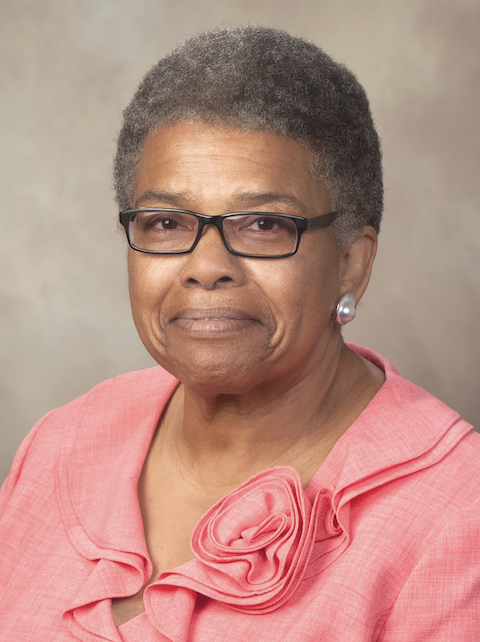
As founder of the Legacy Education and Community Empowerment Foundation Inc. (LEACEF), Slaughter-Harvey has a special legacy of courage, commitment and service to her community. She believes that access to education creates empowerment through service learning projects.
Born in Jackson, Mississippi, in 1946, her family moved to Forest, Mississippi, where her parents, the late Alderman Willie Lee (W.L.) and Librarian Olivia Kelly (O.K.) Slaughter, were both educators.
The Slaughters instilled in Constance the importance of independence, that race was no barrier, and that a person’s worth is determined by the contributions they make to others and not money or materialistic things. She states, “My parents taught me that right is always right.”
Slaughter-Harvey has over 60 years of overcoming systematic injustices, which were imposed upon her due to her skin color, gender, and the state in which she was born.
Despite the gross injustices of the American society, including Jim Crow in the South, Slaughter-Harvey knew that she had a role to play in making this world a better place than the way she found it. As founder of LEACEF, she knows that life is not fair but that you can overcome any injustice if you try.
She has received over 3,000 awards and holds the numerous titles of major firsts, including the first female student government president at Tougaloo College, assist. secretary of state for the State of Mississippi for Elections and Public Lands, and president of the National Association of Election Directors.
Additionally, she was the first African-American female to become a judge in Mississippi and to receive a law degree from the University of Mississippi’s Law School. She is a Golden Life Member of Delta Sigma Theta Sorority, Inc.
Over the years, Attorney Slaughter-Harvey remains faithful to God and remains a viable part of her Scott County community of Forest. She wants to ensure that all children, especially in her rural and low-income community, city, county and state, can strive for the stars and pursue their dreams.
She wants all children to learn all the skills needed to survive in this society and this world. She imagines LEACEF as supporting, encouraging and creating a safe space for children, students and parents to learn to make informed and positive life choices.
The W.L. Slaughter Memorial Foundation and Library and Slaughter-Harvey have provided legal and educational services to the community. And with the assistance of her daughter and LEACEF co-founder Constance Olivia, the family continues to expand community services for student enrichment, mentoring and empowerment programs.
Hon. Alyce G. Clarke
Longest serving African American in the Mississippi State House of Representatives
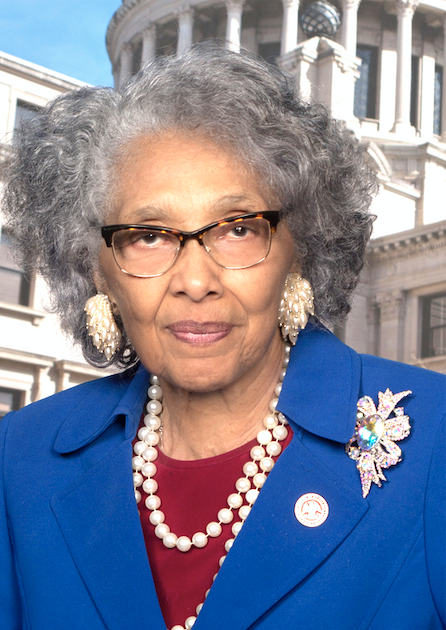
Alyce Griffin Clarke has been a dedicated and active member of the Mississippi State House for 35 years, serving Hinds County District 69.
The State representative earned her B.S. Degree from Alcorn State University and also attended Tuskegee Institute. Her professional experience includes working as a nutritionist and professional consultant and also in the insurance business.
Clarke is affiliated with Alpha Kappa Alpha, Alcorn Alumni, Jack & Jill of America, Inc., MS Public Health Association, Regional Association of Drug Free Schools and Communities and the State PTA.
Her service in the House Committees include:
Appropriations
Banking and Financial Services
Drug Policy
Education
Gaming
Universities and Colleges and
Youth and Family Affairs.
Summarizing her perception of service leadership, she says, “As Mississippians, we know that prayer without works is dead. We’re doing an amazing job praying, but we have to do a better job at working, if we’re going to save hundreds if not thousands of Mississippians.”
Her profile is coupled with biblical scripture from James 2:14-16 (New King James Version): “What does it profit, my brethren, if someone says he has faith but does not have works? Can faith save him? If a brother or sister is naked and destitute of daily food, and one of you says to them, ‘Depart in peace, be warmed and filled,’ but you do not give them the things which are needed for the body, what does it profit?”
Clarke admonishes all: “Please practice social distancing, sanitize everything and stay home (unless absolutely necessary). And remember that we can accomplish anything by working together.”
Clarke was born in Yazoo City, Mississippi, and is married to Lee William Clarke Jr. She is of the Baptist faith.
Hon. Hollis Watkins
Veteran of the Mississippi Civil Rights Movement
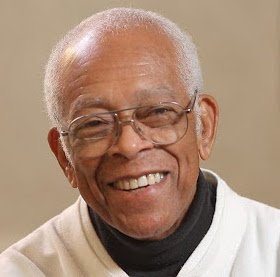
Watkins, veteran of the Mississippi Civil Rights Movement, says Mississippi’s influence on him led to his eternal love for the life of the farmer. And he prays that his beloved state will grow and develop to the extent it becomes a model for others.
Mississippians “drove” the Mississippi Freedom Movement, and in 1961 Hollis Watkins, who grew up on a small farm in Chisholm Mission (a rural Lincoln County hamlet named for an AME Church), became one of the first young Mississippians to commit to full-time work with SNCC – the Student Nonviolent Coordinating Committee.
In the late spring of that year, he was on the way to California to join his sister hoping to work and set aside money for his college tuition. But when word of Freedom Rides coming into Mississippi reached him, Watkins turned around and headed back home. He was 19 years old.
SNCC organizer Bob Moses asked him to join the voter registration organizing effort in McComb, and the next day, Watkins began to canvas for voters. Though he had not been politically active in high school, he soon became a mentor and role model for McComb’s high-school-age activists.
These young people had been inspired by SNCC freedom riders now coming to town to help start the Pike County Nonviolent Direct Action Committee. Watkins was elected president of the new organization, and the committee chose Woolworth’s as their first place for protest.
Only Watkins and Curtis Hayes, his long-time friend and vice-president of the newly-formed nonviolent student group, sat-in at the Woolworth Department Store lunch counter that day – the first of this kind of direct action in McComb’s history.
Police immediately confronted them and arrested them. And in what would prove true over and over again in Mississippi and other parts of the South, the actions of young people changed the thinking of adults. That night, Watkin’s father traveled into town to speak at a mass meeting protesting the boys’ arrests.
That fall, they traveled to Hattiesburg to assist NAACP leader and farmer Vernon Dahmer in his voter registration efforts. This was partnering of young people with an older generation eager to use youthful energy for social change came to characterize Mississippi’s Freedom Movement.
Watkins joined the organizing effort in Greenwood in 1962 and then initiated the Holmes County project. As an organizer, he lived as sparsely as possible, always careful not to take advantage of a community’s hospitality and to listen to voices at the grassroots.
As a native Mississippian, he knew that a community’s first question to the Freedom Riders would be: “How long will you be here?” It stemmed from fear that outside leaders – even coming from another part of the state – would leave once violent reprisals began. But Watkins never left.
He dedicated his life to human rights activism through SNCC and later Southern Echo, his grassroots community organization. He was presented an Honorary Doctorate by Tougaloo College. (Profile courtesy of https://snccdigital.org/people/hollis-watkins)
Hon. Harvey Johnson Jr.
First African-American Mayor of Jackson
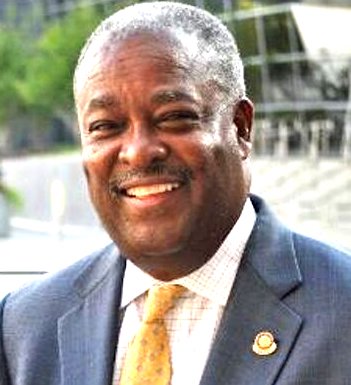
Johnson, in 1997, made history when he was elected the capital city of Jackson’s first African-American mayor by more than 70 percent of the voters.
In 2001, Jackson voters again chose Johnson for a second four-year term, and in 2009, he was elected to a nonconsecutive third term.
Johnson was born in the River City of Vicksburg and received his early education in the Vicksburg Public School District, where he graduated from Rosa A. Temple High School. He receive a bachelor’s degree in political science from Tennessee State University and a master’s degree in political science from the University of Cincinnati.
His additional study was toward a doctoral degree in public administration at the University of Southern California’s Washington Public Affairs Center. He was awarded an honorary Doctor of Humane Letters from Tougaloo College.
Johnson served as the founding executive director of the Center for University-Based Development at Jackson University, facilitating development partnerships aimed at revitalizing neighborhoods adjacent to the university campus, while providing service learning experiences for students and research opportunities for faculty and students – creating the “Urban University.”
Under his mayoral leadership, the city’s Union Station was renovated, transformed into a beautiful new state-of-the-art multi-model transportation center, accommodating trains, buses, taxies, limousines and spaces for retail shops, restaurants and offices.
And he led the effort which resulted in voters approving the construction of the city’s first convention center, located adjacent to a new state-of-the-art, high tech telecommunications training and conference center, successfully campaigning that it be located in downtown Jackson.
As founder and executive director of the Mississippi Institute for Small Towns, a nonprofit agency, Johnson helped a number of towns in the Mississippi Delta in meeting their housing, community development and infrastructure needs.
During his years as mayor, Johnson served on the U.S. Conference of Mayors Advisory Council, as chair of the U.S. Conference of Mayors Urban Economic Policy Committee and as president of the National Conference of Black Mayors.
Johnson is a member of Sigma Pi Phi Fraternity and a charter member of 100 Black Men of Jackson, Inc., currently serving as its president. He has also served in local, state and regional positions for Alpha Phi Alpha Fraternity, Inc., of which he is a lifetime member.
He served on the executive committee of the Democratic National Committee and is also a life member of the NAACP. Johnson was a captain in the United States Air Force.
He is married to Kathy Ezell Johnson, and they have two adult children – Harvey III and Sharla. He is a member of Hope Spring Missionary Baptist Church, serving as chair of its Board of Trustees.
Hon. Dr. John A. Peoples Jr.
Sixth president of Jackson State University; founder of Jackson State’s Army Reserve Officer Training Corp (ROTC)
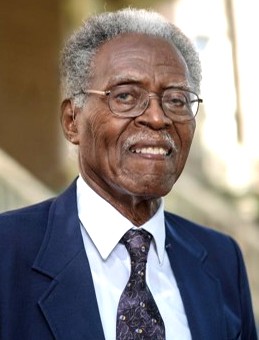
Peoples, the sixth president of Jackson State University, was the founder of the institution’s Army Reserve Officer Training Corp (ROTC). He is a native of Starkville, Mississippi, where he attended elementary and secondary schools.
After graduating from high school, he was drafted into the United States Marine Corps and was “Honor Man” in his recruit training platoon and sharpshooter rifleman; number one in his noncommissioned officers’ class and attained the rank of sergeant.
In July 2012, Peoples was awarded the Congressional Gold Medal, as one of the African-American Marines of World War II who were trained at the racially segregated Montford Point Camp of Camp Lejeune, North Carolina.
He entered Jackson State University in September 1947 where he earned a bachelor’s degree in mathematics. He was on the varsity football and track teams and was elected president of the Student Government Association for two consecutive years.
After graduating number one in his class in 1950, he attended the University of Chicago, where he earned a master of arts and doctor of philosophy degrees.
And after serving 13 years in the public school system of Gary, Indiana, as a teacher and school principal, he was employed at Jackson State University as a professor of mathematics and vice president in 1964.
He was elected president of the university in 1967, serving till 1984. During his 17-year tenure as president, the university experienced dramatic growth in enrollment, program and physical plant.
Student enrollment grew from 2,200 to 7,800; the academic program developed from the baccalaureate level in essentially teacher education to a five-school professional program up to the doctoral level.
The university’s athletic program, under Peoples, produced six Southwestern Athletic Conference (SWAC) championships in football, seven in baseball, 13 in men’s track, five in women’s track and six in men’s basketball.
The administration of Peoples included the dramatic years of the “Black Student Revolution,” experiencing four consecutive years of student upheavals. The most tragic was 1970 when on May 14, city and state law officers fired on students at a women’s dormitory, killing two students and wounding 22.
In 1974, the landmark Ayers vs Waller desegregation suit was filed in Mississippi. Peoples played a strategic role in support of the plaintiff’s efforts against the State College Board to eliminate the dual system of higher education.
He served 25 years on the board of directors of Piney Woods Country Life School and served 20 years on the board of directors of Smith Robertson Museum and Cultural Center.
Peoples is a member of Omega Psi Phi Fraternity, Inc., and Sigma Pi Phi Boule Fraternity. He is a 33rd Degree Mason and a life member of the National Association for the Advancement of Colored People (NAACP). In 1983, the Mississippi Conference of the NAACP conferred on him the Medgar Evers Award.
Hon. Reuben V. Anderson
First African American Supreme Court Justice of Mississippi
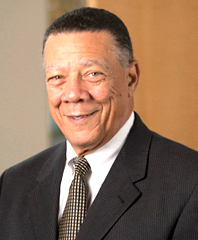
Anderson, Mississippi attorney and jurist, has a series of “firsts” in his career. On Jan. 16, 1985, he was sworn in as the first African-American Supreme Court justice in the state of Mississippi. Appointed by Gov. William A. Allain, it was a position he held until his retirement from the bench in 1991.
Anderson was the first African-American graduate of the University of Mississippi Law School in 1967 and the first African-American president of the Mississippi Bar Association from 1997 to 1998. His admissions came five years after James Meredith integrated Ole Miss. He graduated from Tougaloo College in 1964.
In 1976, he was appointed as judge in the Municipal Court for the city of Jackson. He later held successive judicial appointments: in 1977 to the County Court in Hinds County, in 1981 to the Circuit Court, and in 1982 to the 7th Circuit.
He started his legal career in 1967, practicing with the Mississippi NAACP Legal Defense Fund on significant matters, including desegregation and voter rights cases. After retirement from the bench in 1991, he became a partner with the law firm Phelps Dunbar LLP.
In 1995, Anderson held the Jamie L. Whitten Chair of Law and Government at the University of Mississippi. For his storied career, Anderson has garnered a number of accolades.
In 1995, he was inducted into the Ole Miss Alumni Hall of Fame. In 2007, he was presented the Mississippi Bar Association’s Lifetime Achievement Award. And in 2009, he was inducted into the National Bar Association Hall of Fame. Two years later, he was entered into the University of Mississippi School of Law Hall of Fame. The Reuben V. Anderson Pre-Law Society at Tougaloo College is named in his honor.
He was president of the Mississippi Chamber of Commerce in 2001 and has been a member of the University of Mississippi Foundation Board of Directors and currently serves as chairman of the Mississippi Civil Rights Museum in Jackson, being one of its major development fundraisers.
He is a member of Sigma Pi Phi Fraternity and is married to Phyllis Wright Anderson. The couple’s three children are Roslyn, Vincent and Raina; they have two grandchildren.
U.S. Congressman Bennie Thompson
Serving 13 Terms representing Mississippi’s 2nd Congressional District; Longest serving African-American elected Mississippian
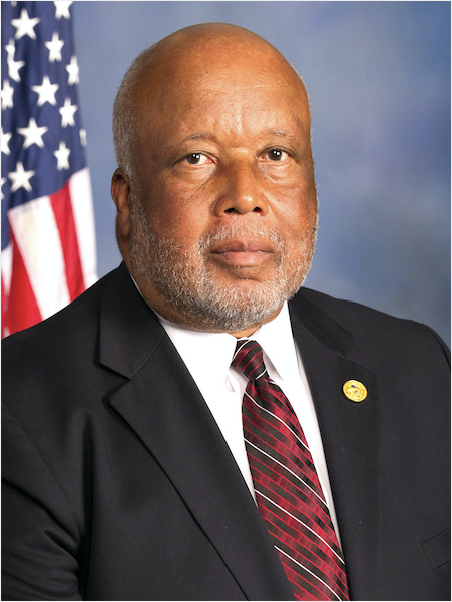
Born in a state with a unique history of racial inequality, Thompson draws inspiration from the legacies of Medgar Evers, Fannie Lou Hamer, Aaron Henry and Henry Kirksey.
The Bolton, Mississippi, native is serving his 13th term in the United States House of Representatives, representing Mississippi’s Second Congressional District since 1993, where he has spent his entire life fighting to improve the lives of all people.
Thompson is the longest-serving African-American elected official in the state and the lone Democrat in the Mississippi Congressional Delegation.
He began his grassroots political activism as a civil rights champion through the Student Nonviolent Coordinating Committee (SNCC) while a student at Tougaloo College. He organized voter registration drives for African Americans throughout the Mississippi Delta on behalf of SNCC, before becoming a school teacher.
From 1969 to 1972, he served as alderman of his hometown, Bolton, before serving as the city’s mayor from 1973 to 1980. He is a founding member of the Mississippi Association of Black Mayors.
He was then elected as a Hinds Country supervisor, holding the position from 1980 until 1993, when he was elected to the U.S. Congress, representing Mississippi’s largest Congressional District encompassing the capital city and the Mississippi Delta.
In 2000, he authored legislation creating the National Center for Minority Health and Health Care Disparities which subsequently became law.
After Hurricane Katrina ravaged the state, he aggressively advocated for disaster relief improvements within government agencies and provided oversight to ensure that federal funds were properly allocated for Gulf Coast recovery.
The following year, Thompson’s Washington colleagues expressed their overwhelming confidence in his leadership abilities and selected him to serve as the first Democratic chairman of the House Homeland Security Committee.
As chairman, Thompson introduced and engineered passage of the most comprehensive homeland security package since Sept. 11, 2001 – H.R. 1, the “9/11 Commission Recommendations Act of 2007.”
The congressman has also served on the Agriculture, Budget and Small Business Committees while working to level the playing field and while being the unabashed champion for civil rights, equal education and healthcare delivery in Mississippi.
He recently entered into a lawsuit against the administration of former President Donald Trump for the insurrection activities against the Capitol Building in which he was present during the Jan. 6, 2021, assault.
Thompson is a lifelong member of the Asbury United Methodist Church in Bolton. He has been married to his college sweetheart, London Johnson of Mound Bayou, Mississippi, since 1968. The couple has a daughter, BendaLonne.
He is an avid outdoorsman and enjoys gardening, reading, and listening to the Blues that also got its start in Mississippi – Home of the Blues.

Be the first to comment